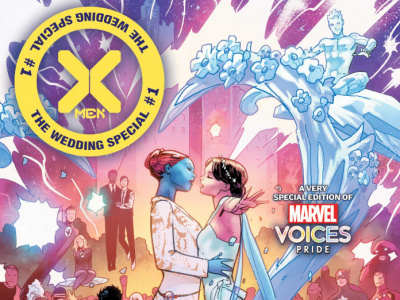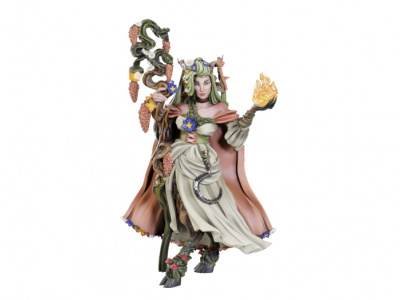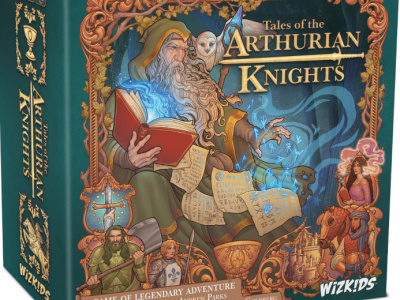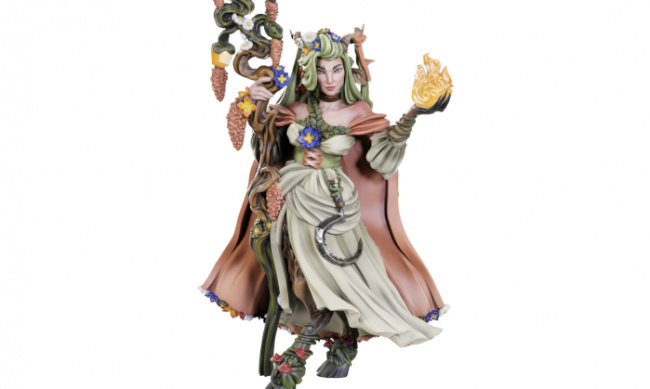UK-based Titan Entertainment has a long history and broad business portfolio that’s invisible to many people in the business, who are only familiar with its recent expansion of comics and graphic novel publishing. We recently sat down with Titan Entertainment Group Managing Director Nick Landau and Executive Director Vivian Cheung to explore some of that history for our readers, and to understand the scope of the company’s activities and ambitions. In Part 2 of this two-part interview, we talk about Titan’s merchandise division, the current shape of its publishing, upcoming expansion, and its retail stores. In Part 1, we talked about the roots and expansion of Titan’s publishing operations.
And you’ve added a merchandise line?
Landau: We started that in the early 80s. It was unbranded in those days, but we were really doing it as something that came out of our retail operation, Forbidden Planet. We did a ton of 2000 A.D. merchandise. We were doing apparel, a whole range of giftware, things like candles, which we loved because people would go out and destroy their own products. We loved things that involved sculpting; we loved things that involved creative design, so we did that for a number of years. The retail operation at the time was on a street in London called Denmark Street, which was like Tin Pan Alley. We’d have all the music bands come down and we convinced quite a few of them to wear our apparel. So we found that we had quite a big merchandise operation in the U.K. because the bands were wearing them at concerts, on TV appearances, and people were asking for our Judge Dredd merchandise.
What are your key merchandise products or categories now?
Landau: There are two key merchandise areas, apparel and Titan vinyls. We do a blind box with a new release every month, 14 to 20 figures a month. We have a significant range of licensed characters, with Doctor Who. We have seven or eight different ranges of Doctor Who.
Is that your #1 product category?
Landau: Overall, it is. We have everything from [classic] Ghostbusters to Breaking Bad, to Alien vs. Predator. We have dozens of different licenses that we create Titans for. Titans is basically a 3-inch blind box figure with accessories. Really it’s really the top end of the market. We get a lot of feedback about the sculpting, about the manufacturing execution of those figures and we have a hashtag, #welovetitans, which shows the range of Titans that we do and fans all over the world that take pictures of them, sticking them on the website.
And the other area is apparel?
Landau: Yes. We have t-shirts and other forms of apparel.
What’s your #1 North American licensed t-shirt line?
Landau: I would say it’s Doctor Who. We have a number of very large retailers who are very passionate about Doctor Who and so overall sales would probably be Doctor Who.
You’ve got licensed graphic novels, original graphic novels, bande dessinee, art books, merchandise. Is comics and graphic novels the biggest part of your publishing?
Landau: The biggest part of publishing would be a toss-up between our illustrated books and our fiction. You have to bear in mind that comics and graphic novels are a part of the business that we’ve only been in for three or four years. We came into the business in 2013, that’s when we started to ramp up. Although we’ve been in the business for 40-plus years, our comics and graphic novel business is a very recent one. We’re ramping up, publishing about 20 to 25 titles per month. It’s the fastest growing division.
What are your bestsellers?
Landau: Currently, because we’re bringing in quite a range of titles every month now. If you had asked me a few months ago, it would be Doctor. Who. But, as you know, you can get a strong first issue sale, and the key is whether that holds. We’ve had a lot of success with titles like Dark Souls, Penny Dreadful.
Again, playing into the fact that we play across into TV, movie, gaming and literary categories. If you ask what would be the hottest in the U.K., that would be one of our literary properties, Rivers of London, which means very little here, but in the U.K. it’s an absolute top science fiction property. The original author, Ben Aaronovitch, is writing the comic book series. It’s original comic stories in the universe. It’s really popular and it’s building in the U.S. (see “Urban Fantasy 'Rivers of London' Comes to Comics”).
What’s your bestselling bande dessinee?
Landau: Snowpiercer is definitely our top seller.
What’s the state of the North American comics and graphic novel market from your perspective? What is the reception for your titles?
Landau: We are growing significantly. Part of that is that we’re a new business. We can see that there is market growth.
A few months ago I would have said SKU averages were not as strong, but the overall market was growing in the breadth of titles. However, we’ve seen SKU average growth as well, which is really what you want.
We’re feeling quite bullish about the market, very excited about it, with the number of new launches that we’ve got coming up and some new partnerships. We’ve got two very exciting partnerships that we’ve formed. One is with the British movie studio, Hammer, and we are launching the first in a series of titles with them (see "'Assassin's Creed' Manga, 'Hookjaw,' 'The Mummy'"). And being with a movie studio, there’s very good potential for those comics be ultimately be developed. For that reason and that there’s a history of fans who are very excited about those properties, that’s a really interesting range to follow.
The other one is Hard Case Crime, which we are going to be launching in October at New York Comic Con. We’ve been the publisher of the Hard Case imprint in fiction, for years. We’ve been looking forward to the time where we could bring those same sensibilities to the comic book market. What we’re doing, effectively, is broadening the comic book base. With Hammer we’ve got a very a strong, proprietorial horror line and with Hard Case Crime, we have a noir crime line. We’re working with very strong brands to develop them. So we’re not just going out and saying we’re going to do a horror comic and a crime comic. They’re not drifting. They’re actually tied up with strong brands.
In terms of how you approach the market here in North America. You’ve got your comic store distribution through Diamond and you’re also in the book channel, correct?
Landau: I think we were the first English language traditional comic publisher to go with Random House [Publisher Services]. We’ve been working with them for eight to 10 years.
What’s bigger here for you, your book store or comics channel business?
Landau: Our book store business, again because we’re very new to the comic store business and growing that business very fast. If you ask me in a couple of years, it might be a different answer.
Are you doing anything with digital?
Landau: With digital, we are working through the traditional digital channels. Our agreement is to basically make our comic books available to as wide a market as we can. I think we were one of the first publishers to make our comics available digitally in China. And we were at the beginning of the Trajectory launch, as well as comiXology and e-books. Digitally, we may have been one of the first publishers to distribute more than one million comics of a single title, which was Wallace and Gromit. We were very early adopters of the digital channel.
A lot of retailers who buy your books and comics may not realize that you’re also a retailer, with Forbidden Planet and one of the most amazing stores in the world. Can you describe Forbidden Planet and what your retail operation is like?
Landau: Our retail operations started in 1978 with our first store at Denmark Street, London. We started our retail store because we were a comic book distributor, and we were about to lose our largest retail customer, which represented 50% of our business, so as a safeguard we opened a comic book store and called it Forbidden Planet, and protected our business. We found we were really enjoying retail and very quickly expanded. We opened the New York store in 1981 and a number of stores in the U.K. through the ‘80s. After Vivian and I formed the Titan Entertainment Group in 1993, we opened about another half-dozen stores in the U.K.
We have a combination of what we call mega-stores, like the London store you described. We have four mega-stores now. We tried to create an environment where anybody would find it comfortable to shop for comic. Lots of lighting, wide aisles, wheel chair access, range of stock, well signed and posted, which is very important, so our customers can have a really good, fun time when they come into a Forbidden Planet. We do a lot of marketing outreach and we’re very closely tied in with the movie studios. We get a lot of appearances. We find that, particularly in the London store, because so many of the major comic movies are filmed in the U.K., that we get a lot of directors, cast and crew who come over and hang out, which is fun.
Are there any other key Titan releases for Fall that you haven’t mentioned?
Landau: The other one we should highlight is Warhammer 40K. That is going to be released in October/November (see "Exclusive! 'Warhammer 40K' Comic Creative Team, Covers, Release Date"). And we’re very excited about building a universe of titles around the Games Workshop series. Beyond that, we’re just making announcements as we go. We have a lot of new titles coming up with some very high profile creators and we’ll be announcing those over the coming months.
Click here to go back to Part 1.

Merch, Channels, Coming Expansion, and Retail Stores
Posted by Milton Griepp on September 16, 2016 @ 4:13 am CT
MORE COMICS
From Marvel Comics
April 26, 2024
This landmark comic book special marks Marvel Comics’ first woman-to-woman wedding.
With a Mix of Manga and French Graphic Novels
April 26, 2024
The catalog will include both manga and French graphic novels.
MORE NEWS
For Fall
April 26, 2024
WizKids will release a new range of Critical Role Unpainted Miniatures for Fall.
With Excalibur and Holy Grail Promo Meeples
April 26, 2024
WizKids will release Tales of the Arthurian Knights, a standalone sequel to Z-Man’s Tales of the Arabian Nights, with Excalibur and Holy Grail Promo Meeples with every case.







